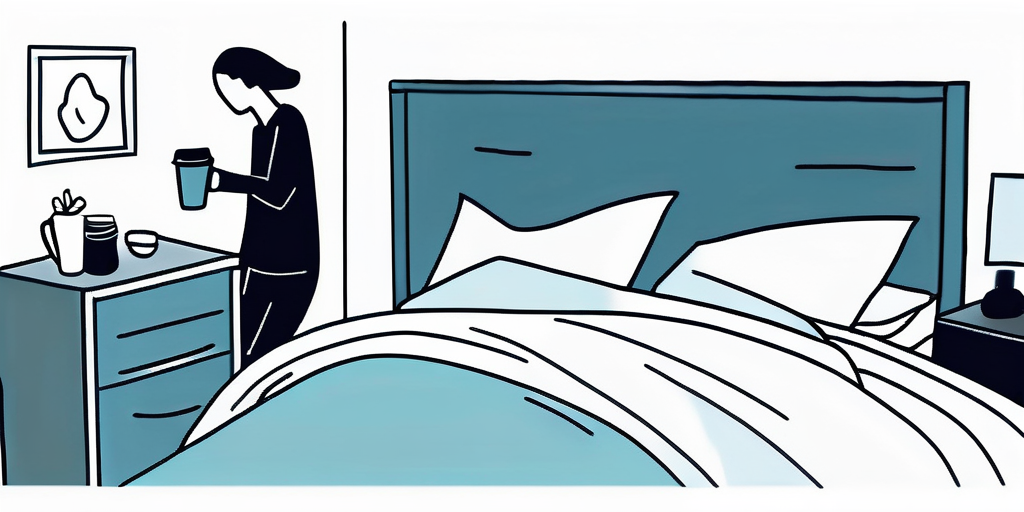Have you been struggling to get a good night’s sleep? If so, you’re not alone. Many people struggle to fall asleep or stay asleep throughout the night. Fortunately, there are several strategies you can try to improve your sleep quality and wake up feeling refreshed and rejuvenated. This article will explore five tips to help you achieve your desired restful sleep.
Understanding the Importance of Sleep Quality
Adequate sleep is essential for our overall health and well-being. It allows our bodies to rest and repair and plays a vital role in cognitive function, emotional well-being, and immune system regulation. Unfortunately, many don’t prioritize sleep, leading to declining sleep quality. Lack of sleep can impact our mood, concentration, and physical health. It is crucial to understand the importance of sleep quality and take steps to improve it.
One fascinating aspect of sleep is its impact on memory consolidation. During sleep, especially during the deep stages of non-REM sleep, the brain processes and stores information from the day. This process is crucial for learning and memory formation. Research has shown that individuals who get sufficient high-quality sleep are better able to retain information and perform well on memory tasks than those who are sleep-deprived.
Furthermore, the body’s immune system relies heavily on adequate sleep to function optimally. While we sleep, our immune system produces cytokines, a type of protein that helps the body fight infections and inflammation. Chronic sleep deprivation can reduce the production of these protective cytokines, making us more susceptible to illnesses. Therefore, improving sleep quality is not just about feeling well-rested; it’s also about bolstering our body’s defenses against potential health threats.
How Poor Sleep Affects Your Health
Poor sleep can significantly impact our health. It can contribute to a range of health issues, including obesity, diabetes, cardiovascular disease, and weakened immune function. Additionally, lack of sleep can affect our mental health, leading to increased anxiety, depression, and difficulty managing stress. By addressing the factors that affect sleep quality, we can reduce the risk of developing these health problems and improve our overall well-being.

But did you know that poor sleep can also affect your cognitive function? When you don’t get enough sleep, it becomes harder to concentrate, make decisions, and retain information. Your brain needs adequate rest to function at its best; without it, you may struggle to stay focused and alert throughout the day.
Furthermore, poor sleep can also impact your physical appearance. Have you ever noticed dark circles under your eyes after a night of tossing and turning? Lack of sleep can cause fluid to accumulate under your eyes, leading to puffiness and discoloration. Chronic sleep deprivation can also contribute to premature aging, as your body doesn’t have enough time to repair and regenerate cells while you sleep.
Tip 1: Create a Consistent Sleep Schedule
Establishing a consistent sleep schedule is one of the most important steps to improve sleep quality. Going to bed and waking up simultaneously every day, including weekends, helps regulate your body’s internal clock. This consistency trains your body to recognize when it’s time to sleep and when it’s time to wake up. Aim for seven to eight hours of sleep each night, and be mindful of how caffeine and late-night activities can disrupt your sleep schedule.
In addition to a regular bedtime, creating a relaxing pre-sleep routine can signal your body that it’s time to unwind. Consider engaging in calming activities such as reading a book, taking a warm bath, or practicing deep breathing exercises. Establishing a consistent sleep schedule and incorporating relaxation techniques can improve sleep quality and prepare you for a restful night.
Tip 2: Optimize Your Sleep Environment
Your sleep environment plays a crucial role in your ability to sleep well. Create a bedroom that promotes relaxation and restfulness. Keep your bedroom calm, dark, and quiet. Consider using earplugs or a white noise machine to drown out distractions if outside noise is an issue. Additionally, invest in a comfortable mattress and pillows that adequately support your body. Your sleep environment should be free from distractions, such as electronics or bright lights, that can interfere with sleep quality. By optimizing your sleep environment, you can create a space that promotes deep and uninterrupted sleep.
Moreover, did you know that your sleep position can also impact your sleep quality? Sleeping on your back is generally considered the best position for spinal alignment and reducing the risk of developing sleep-related issues, such as sleep apnea or snoring. However, if you prefer sleeping on your side, use a supportive pillow that keeps your neck and spine aligned. Finding the right sleep position for your body can make a significant difference in the quality of your sleep.
Tip 3: Incorporate Relaxation Techniques Before Bed
Stress and anxiety can make it difficult to fall asleep and can lead to restless nights. Incorporating relaxation techniques into your bedtime routine can help calm your mind and prepare your body for sleep. Deep breathing exercises, progressive muscle relaxation, and guided meditation reduce stress and promote relaxation. Experiment with different techniques to find what works best for you and make it a regular practice. By incorporating relaxation techniques before bed, you can quiet your mind and increase your chances of sleeping well.
Tip 4: Limit Caffeine and Electronics Use
What we consume and how we spend our time leading up to bedtime can significantly impact sleep quality. Caffeine, a stimulant in coffee, tea, and some sodas, can interfere with sleep. Avoid consuming caffeine at least six hours before bedtime to give your body enough time to process it.
Similarly, using electronic devices such as smartphones, tablets, and laptops can disrupt sleep by emitting blue light that inhibits the production of melatonin, a hormone that regulates sleep. Aim to limit electronic use at least an hour before bed to allow your body to prepare for sleep naturally.
Tip 5: Consider Chiropractic Care for Better Sleep
Chiropractic care focuses on improving the alignment and function of the spine, which can positively impact overall health, including sleep quality. One of the most commonly reported side effects of chiropractic care is improved quality of sleep, and the US National Sleep Foundation estimates that one-third of chiropractic patients and 40% of infants report an increase in sleep quality following an adjustment.
Consulting with a chiropractor who understands sleep disorders can help identify underlying issues and develop an individualized treatment plan to improve sleep quality.
Remember, getting enough quality sleep is essential for your overall health and well-being. By implementing these tips and prioritizing sleep, you can reap the benefits of a good night’s rest and wake up refreshed and rejuvenated.
FAQs About Improving Sleep Quality
Now that we’ve covered the five tips for improving sleep quality, let’s address some frequently asked questions:

Q: How long does it take to notice improvements in sleep quality?
A: The time it takes to notice improvements in sleep quality can vary from person to person. With consistent implementation of the tips mentioned above, you may begin to experience positive changes within a few days to a couple of weeks.
Q: Can poor sleep quality be a symptom of an underlying medical condition?
A: Yes, poor sleep quality can be a symptom of various medical conditions, such as sleep apnea, insomnia, or restless leg syndrome. If you’ve tried the tips mentioned in this article and still struggle with sleep, consulting with a healthcare professional for proper diagnosis and treatment may be beneficial.
Q: Are there any natural remedies that can improve sleep quality?
A: Yes, several natural remedies can improve sleep quality, including herbal supplements like chamomile or valerian root tea, lavender essential oil for aromatherapy, and practicing relaxation techniques, as mentioned earlier in this article. It’s always advisable to consult with a healthcare professional before trying any new remedies.
Q: Can exercise help improve sleep quality?
A: Yes, regular exercise can contribute to better sleep quality. Physical activity can help reduce stress, increase serotonin levels, and regulate the sleep-wake cycle. However, avoiding vigorous exercise too close to bedtime is important, as it can energize the body and make it difficult to fall asleep.
Improving sleep quality is essential for our overall health and well-being. Following the tips outlined in this article, you can make positive changes to your sleep routine and enjoy the benefits of a restful night’s sleep. Remember, it’s important to be patient and consistent with your efforts. If you continue to struggle with sleep, don’t hesitate to seek professional advice to address any underlying issues.
Natural Remedies for Improving Sleep Quality
Now, let’s delve deeper into natural remedies for improving sleep quality. Alongside chamomile and valerian root tea, another popular herbal supplement is passionflower. This beautiful flowering plant has been used for centuries to promote relaxation and alleviate insomnia. Passionflower increases gamma-aminobutyric acid (GABA) levels in the brain, which helps calm the nervous system and induce sleep.
In addition to herbal remedies, incorporating certain foods into your diet can also help improve sleep quality. For example, kiwi fruit has been found to have sleep-enhancing properties. This small, fuzzy fruit is packed with vitamins, minerals, and antioxidants, but the high levels of serotonin and antioxidants make it a great bedtime snack. Serotonin helps regulate sleep patterns, while antioxidants protect against oxidative stress, which can disrupt sleep.
Furthermore, creating a sleep-friendly environment can significantly impact the quality of your sleep. Consider investing in a comfortable mattress and pillows that adequately support your body. Additionally, blackout curtains or an eye mask can help block out any unwanted light, creating a dark and peaceful atmosphere. Don’t forget about the importance of temperature control as well. Keeping your bedroom cool and well-ventilated can promote better sleep by creating an optimal sleep environment.
Ready to Drastically Improve Your Sleep Quality?
Sleep is a vital component of our daily lives, and prioritizing its quality should be a top concern. By exploring natural remedies, optimizing your sleep environment, and seeking professional guidance, you can take proactive steps toward achieving a restful night’s sleep.
Remember, small changes can make a big difference, so embrace the journey towards better sleep and wake up refreshed and rejuvenated each day!
If you want more advice on improving your sleep quality – let’s get in touch!



